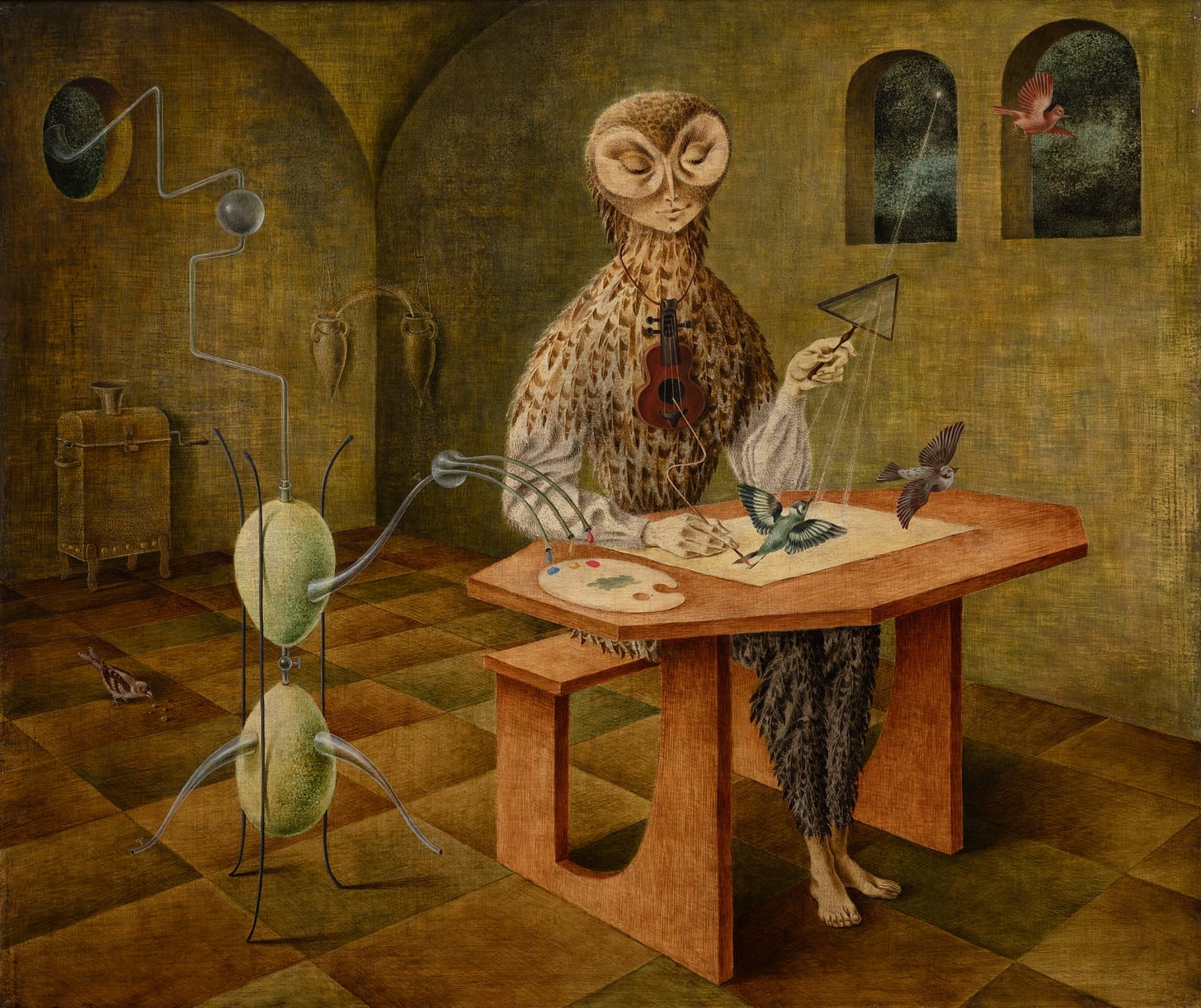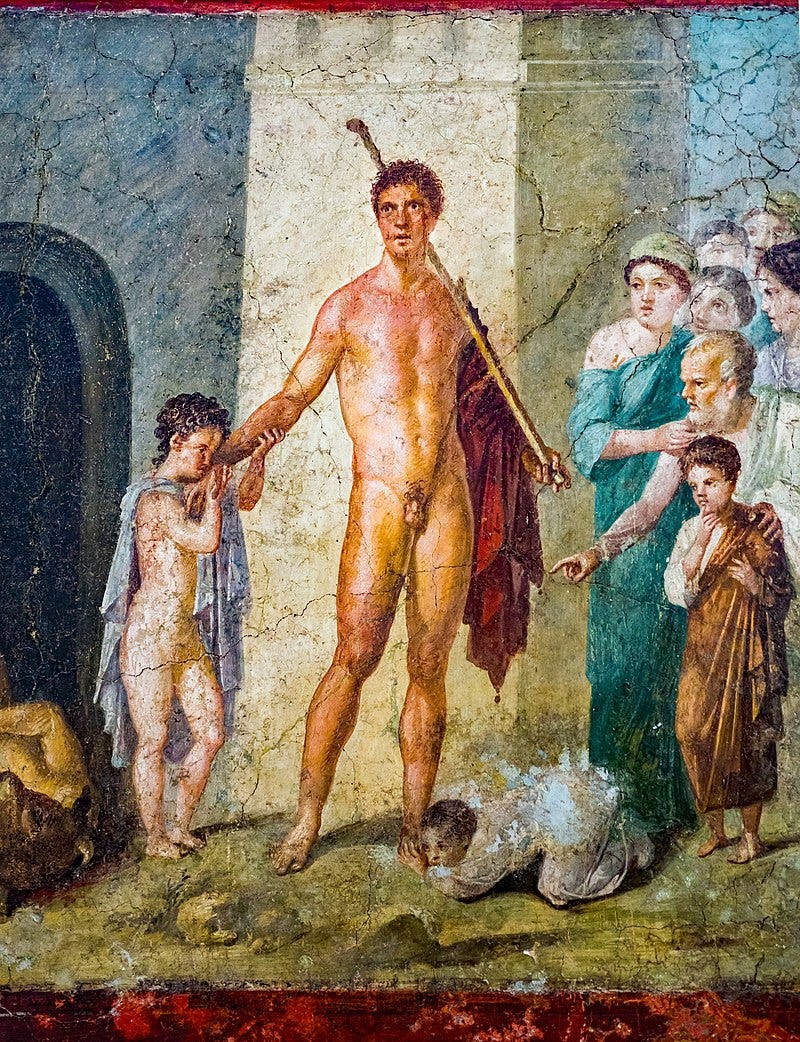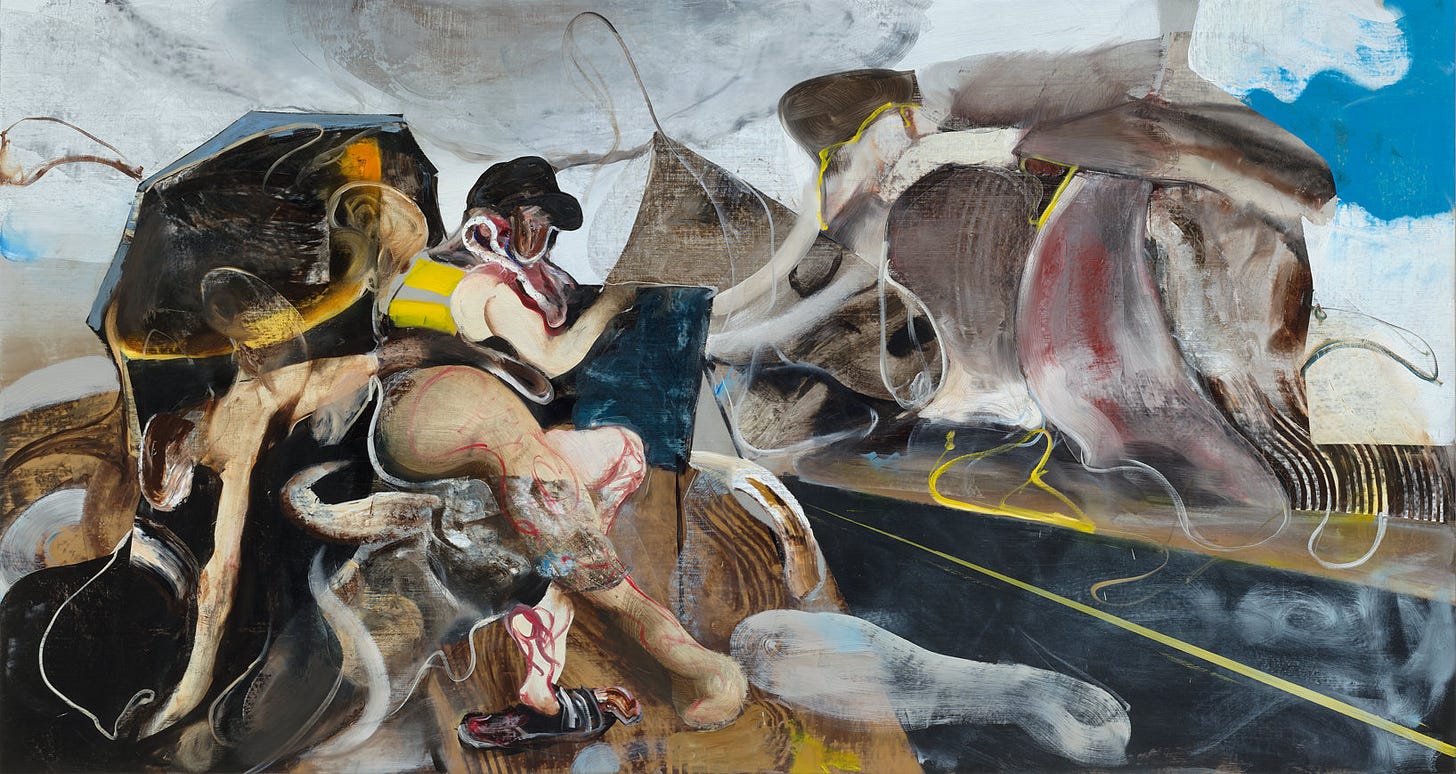Gravity's Rainbow - Part 1 - Chapter 17: Outside and Inside
Analysis of Gravity's Rainbow, Part 1 - Chapter 17: Spectro's Death and Pointsman's Insanity
Dreams map the future onto the present, or the past onto the present depending on which angle you look at it from. Things, as time goes on, become more abstract, more impossible to parse. Their sound waves grow and grow to the point that you notice no difference in their delta-T. They seem as they were before, almost blending into the accelerating world, and with all the world’s changing landscape, why would one notice Them changing, evolving, too? It is only when they disappear for a second or allow something to glimmer through — get perhaps a bit too close to discovering the truth — that we notice them. It is when they give us a moment of relief that we sense their presence.
So, Pointsman experiences his dream — the persistent bombers flying back and forth mapped over images and thoughts of his childhood home. The never-ending sound of the bombers has become something normal to him. It acts as a catalyst for nostalgia, though something has changed. For, instead of following his typical trajectory, he chooses another, decides to explore a route that has before gone unseen, and almost realizes that things are most sinister than they seem. But then a knock comes at the door. That minor note that should never have woken him up, in fact, does. Spectro has died sometime in the night.1
The White Visitation, through their medium, Carroll Eventyr, speaks to Spectro sometime later, though Pointsman is not there. If he were, he may have heard Spectro’s clue: Foxes. Foxes being the human subjects who Spectro had used in his own experiments — the subjects Pointsman so greatly and greedily desired. The Fox he references could be Slothrop — having recently left the vicinity of The White Visitation coincidentally, once again, right before the rocket struck — but it could also be a warning, now being bellowed out from the underworld in a particular circle of hell. Instead of hearing this clue or warning, Pointsman sits in his study, paranoid now that he and Gwenhidwy are the final surviving members of the seven who possessed The Book, the other five having been killed by various forms of military hardware. He wonders if it is a curse put upon him, or just chance. Could the Foxes be the answer?
He realizes he is going a bit mad and contemplates the nature of the system which he is helping maintain. The paradoxical nature of it all. It would, to any sane and worthwhile individual (and Pointsman, though a bit psychotic, power hungry, and as shitty of a person he is, is not as inherently evil as someone like Blicero), be ideal for all of these events to be reversed so that none of this had ever happened2. But this is an impossibility. Though, to further send Pointsman and the others into a state of insanity, the war creates further paradoxes as “Each firebloom, followed by blast then by sound of arrival, is a mockery (how can it not be deliberate?) of the reversible process” and “with each one the Lord further legitimizes his State” (139). Whether these paradoxes and mockeries are purposeful or planned makes no difference. They have formed a perfect system that continues their plan in ways both intentional and as unplanned, though desired, fallout.
If you can’t believe in Pointsman’s humanity — or in the fact that he and many of these members of the intelligence agency (Mexico, Pirate, Jessica, Spectro . . . whomever) who are actively working against a better world at the moment may actually not have evil in their hearts — then read on. They each have their struggles — each with a fault or set of faults that they worry over, with known inability or unwillingness to alter their path, with memories of their past that flood their mind and pollute it with self-hate, with obsessions over imperfections and a perceived hopelessness that you can do nothing about them — that you are stuck wondering, “I do not think that they will sing to me”3 — and with hate borne directly from it all, the only thing keeping him going being his promise to the seven original holders of The Book that they would win the Prize. That all of this would not be for nothing.
To achieve this prize, Pointsman sees himself conquering the maze, slaughtering the Minotaur held within. He sees the Minotaur as a beast to be sought and bested in order to achieve his goal, gather his riches, and keep his promise. That’s what we’re all told. That our goal is a few struggles away, that we can reach it, and that in attaining it, we will have succeeded. What we are not told is that that goal was placed there, hidden away like the dog in the car whose “amber eyes gaze into Ned Pointsman’s own” (143). That this being has been trapped here not for us to conquer by chance, but for us to find because They wanted us to find it. They know that the desire for status has been built into our hearts for it is all we have ever been told is important. So, what else is one to do when the maze opens up before us?
Slothrop has become his new Minotaur. The Minotaur, once again, has been placed there. The maze to get to it is just one more enticing factor to urge him forward. And all of Pointsman’s past leads him to this point. Every moment must now be related to his intended purpose: his imperfections, his desires, his insanity, and even the minor events leading up to now. They are inseparable from what They desire him to do, for now he has no purpose but to discover what has happened to Slothrop.
The bomb was dropped mere blocks from where Slothrop slept with Darlene, killing Spectro — another cause and effect, stimulus and response. As in all science, “you design a modest experiment” (144) to find out how this occurs. But in this case (or maybe in more than we believe) could it be possible that the response was not cause and effect? That the bomb landed exactly where it needed to, killed exactly the person who was intended, to enact another exact response? Pointsman may not be the only scientist, and Slothrop and the dogs may not be the only subjects. They are just another reverse, a mirror image, of one another, all enmeshed for the same reasons. All on equal footing, being used against one another. Each thinking the other is a monster, but none looking outside of the system that is presented: not looking Outside, but In.
Perhaps one of the most underrated chapters in Gravity’s Rainbow. There is so much gorgeous prose, philosophical reflections, perfectly executed allusions, and an emotional narrative that it is all tied up in. It is one of the best chapters to see how Pynchon views the many layers that affect how we act whether by our own control or someone/something else’s.
Next week’s will probably cover the entirety of Chapter 18 (though admittedly it is one that I’ve always struggled with for some reason…) So stay tuned for that!
I just want to note that this whole first section from the beginning of the chapter until the break on page 138 is one of the best and most haunting depictions of a dream ever written. 10/10. Pure perfection.
Think: The scene in Slaughterhouse-5 where the bombers suck up all the debris and bombings as the television plays in reverse.
The Love Song of J. Alfred Prufrock by T.S. Eliot — this section really reminds me of the poem.





Great chapter, great summary. It's an interesting question you raise, is Pointsman evil? He is definitely presented in a way that generates more identification and sympathy from the reader, even if only we spend so much time in his head, we can start to see the world a little bit as he does it. And yet he lets slip a deep desire for violence, an inner monstrousness, where you realize that he would do anything for his "science," and really wants to in a way that reminds me of Israel Keyes or Dexter.
interesting that for Pointsman the Nobel Prize makes Stockholm his Mecca. It makes me reflect on the power of the first ever great oil fortune of Alfred Nobel and his decision to endow a prize that would be used to guide all of the sciences down specific and sometimes narrowly-defined paths
Just dumping from the Pynchon wiki here
142.32 Reichssieger von Thantatz Alpdrucken
The name of the dog that Pointsman seeks translates loosely as "Realm of Victory over the Nightmare of Death." or "The Reich's Deadly Night-terror Champion."